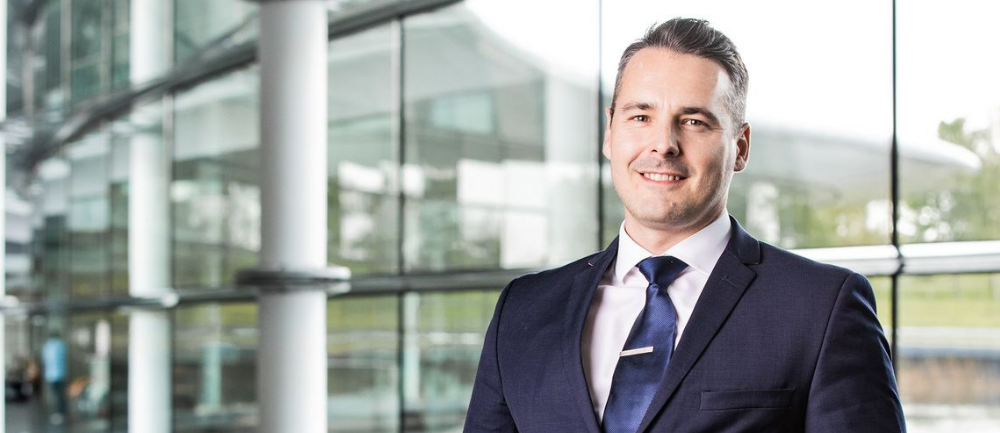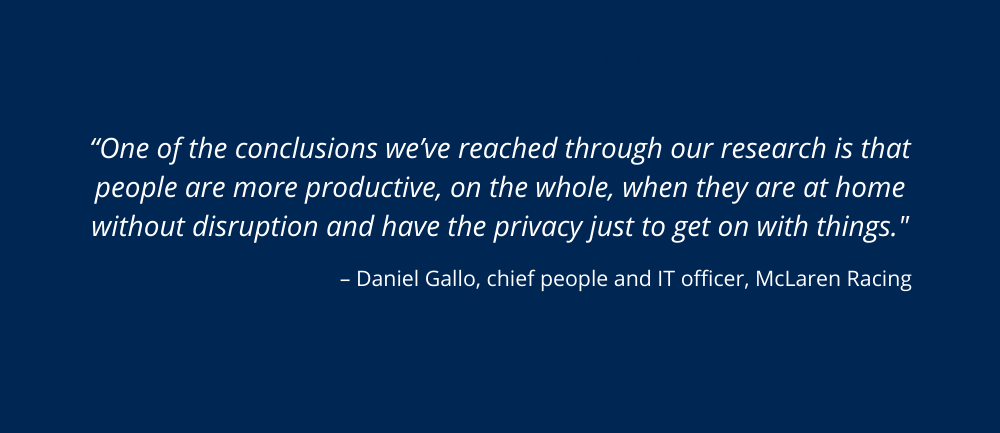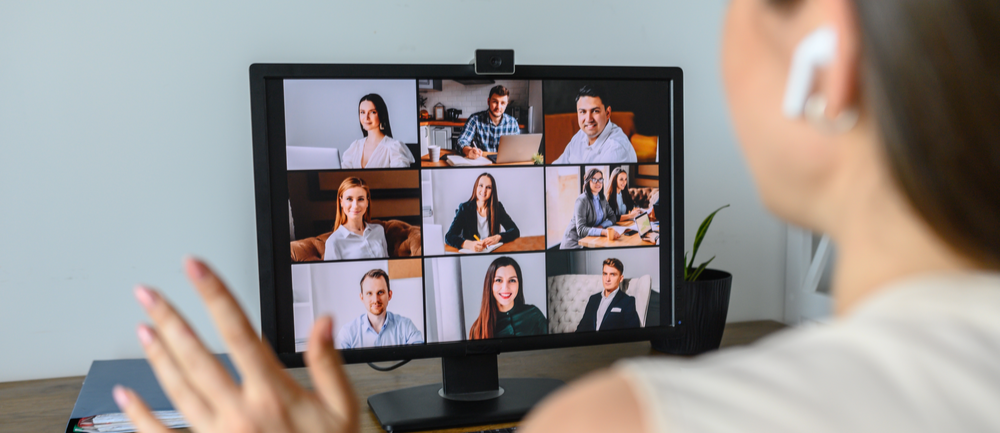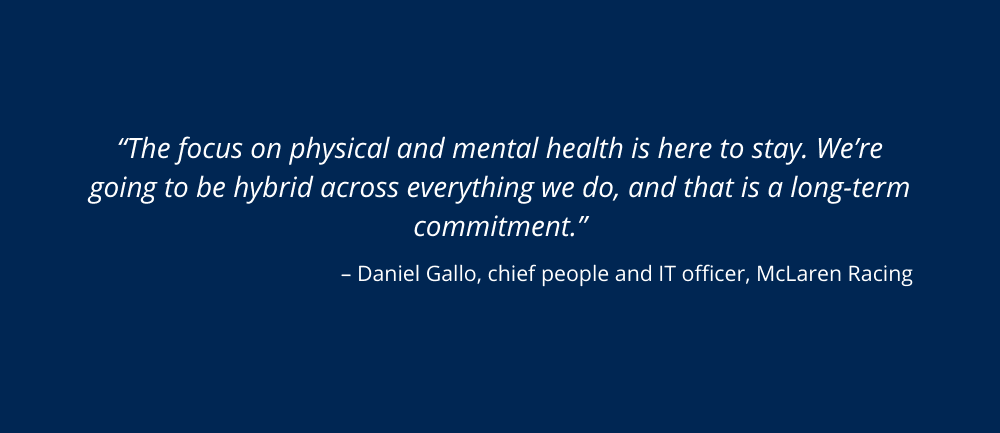-
Provided by

- Date published: Jul 7, 2021
- Categories
McLaren entered Formula 1 in the early 1960s and since then has claimed 20 major titles, propelling drivers such as James Hunt, Niki Lauda and Ayrton Senna to global acclaim. Building on this success, the Surrey-based company has branched out into IndyCar and Extreme E racing, and e-sports. Today it also manufactures luxury supercars and encompasses an applied technology unit, which makes the company’s innovation available to other industries.
The long period of lockdown that followed Covid-19 represented a major leap into the unknown for an organisation that had previously been extremely office-centric. Here Daniel Gallo, McLaren Racing’s chief people and IT officer, explains how the company has negotiated this challenge and moved towards a hybrid working model, one with trust and responsibility at its very core.
Determining the future of teams
Like McLaren Racing, Daniel Gallo is used to success. Before joining McLaren, he served as group HR director at Liverpool Football Club, leaving just before Jurgen Klopp’s team won the Champions League in May 2019.
For Daniel, an ardent McLaren fan, the role offered an even bigger opportunity with one of the world’s most recognisable motorsports brands. However, it also represented a major step-up in operational complexity. Each grand prix requires the dispatch of a vast caravan of engineers, technicians, marketers and event managers. And this challenge has only increased in the wake of Covid-19, when the vast majority of McLaren’s workforce went remote.
McLaren has always been office and factory-based, anchored by its space-age technology centre in Woking. By going remote, the company has been forced to recalibrate an approach that brought success for over 50 years.

However, the move to remote working has gone as well as anyone could have expected. Despite all the turmoil, Daniel says levels of productivity and engagement have remained high. So now, the people leadership team is preparing to adopt a long-term hybrid approach for its office-based employees, which has already been communicated to the company and will be formally enacted once the final Covid-19 restrictions are lifted in the UK.
Under this new policy, each team is invited to determine their own future. No role is fully remote, and employees in each of McLaren’s three principal departments – engineering, marketing and its support functions – will be expected to maintain a strong presence in the office. However, within this broad structure, there are no set targets. McLaren trusts its people to determine what is right for them.
“During the pandemic, around two-thirds of the workforce went fully remote, and everyone other than our operations workforce, which is around 300 people, is still predominantly working from home,” Daniel explains. “However, since restrictions started to ease, we have responsibly invited people back in for on-site collaboration.
“This is non-prescriptive. It is giving individuals and team managers a choice as to how they organise and how they do their work in a much more flexible fashion, which allows for a combination of office and home-based working.”
The foundations of change
The roots of the policy were actually laid before Covid-19, when Daniel and his colleagues researched the concept of dynamic working, which may be seen as a forerunner of the hybrid model. Dynamic working allows staff to determine their own hours and, crucially, defines productivity according to results rather than working hours.
After speaking to employees about where they felt most productive, McLaren’s people leaders opted to experiment with a mixed model, which avoided rules and objectives. Now, that policy is being extended and codified.
Although it is less rigid than a flexible working strategy, which sets long-term goals and plans for each employee, McLaren’s hybrid model is based on the same core definition of productivity: output, rather than presenteeism, is now the key factor. And the office is now a place to perform high-value creative work rather than simply punch in and out.
“One of the conclusions we’ve reached through our research is that people are more productive, on the whole, when they are at home without disruption and have the privacy just to get on with things,” Daniel says.

“However, when it comes to real collaboration and ideation, that’s where our people said, ‘actually we want to get together with our colleagues.’ It’s that unprompted engagement that tends to work better in person.
“We’re positioning this so the office becomes a real collaboration and innovation hub. Teams can come together because they have common projects or problems that they need to work on and it’s better to do it face to face, or they want to connect with people and ideate together. It’s where we want people to come together with purpose, rather than it just being the centre of gravity for all work, irrespective of type or nature.
“The office is still going to be important given the type of organisation we are and in order to foster our culture as a high-performance sports team. That’s really important for elite sports organisations. All we’ve done is refined it in terms of not making it the absolute centre of gravity, where people arrive at 8am on a Monday, leave at 6pm and you times that by five.”
Calculating the appropriate investment
To facilitate this cultural shift, Daniel and his team have committed significant time and money into equipping their employees for the new hybrid working model, and ensuring they receive the support they need.
Every office-based employee has received a full set of distance working tools: screens, keyboards, mice and docking stations. McLaren is making extensive use of Cisco Webex, a key partner for the team, as well as Yammer. Video calls and virtual all-hands meetings have replaced the old summits in McLaren’s learning centres.
To protect employee welfare, the people leaders have drawn on their partnership with Mind, making several of the charity’s tools available across the company. Healix, the company’s private healthcare provider, has been engaged to provide mental health support through its online resources, and a Harley Street-based clinic, Cognacity, has worked directly with the race team – the travelling crew which spends a huge amount of time overseas and is currently forced to negotiate quarantine regulations in each country.
Alongside this investment in work and wellbeing tools, McLaren has also rethought its approach to employee communications. The goal, Daniel suggests, is to stay in touch with staff through channels that work for them.
“We’ve pushed a deliberate focus on the quality, frequency, timing, tone and transparency of communications to really help people navigate a situation that was incredibly ambiguous and constantly evolving.
“We also started issuing weekly, sometimes bi-weekly articles, videos and support materials around remote working, staying engaged with our colleagues and managing your mental health.”
Achieving a balance
However, the communications policy is also distinctly light-touch. The core tenet of McLaren’s hybrid strategy is self-determination; an excessive, invasive outreach programme would be inimical to that fundamental aim.
“We didn’t force [wellbeing communications] on our people”, Daniel says. “A lot of it was pull rather than push. We just made it available.
“In the new world of distance working becoming the norm, teams are naturally looking for more rules-based guidance than we’re giving them. That’s deliberate. We want them to find a way that works for them, for their team, for their department.”
This delicate balance – interaction without intrusion – requires a blend of skills from mid-level managers, too.

“Protecting the fundamental basis of two-way trust is about the regularity of touchpoints. We’re not talking about checking up on someone, but rather engaging with and supporting them. When you aren’t seeing someone day in, day out, this is really important.
“On the flip side, for the employee it’s important to know they’re not falling off the manager’s radar. If you start to feel that, people can start to gravitate back to the office environment just to be present. That is exactly what we don’t want to do.
“We did give support to our managers and leaders. Some of them took to it naturally—others we’ve had to support and encourage. But actually, I’m really pleased with the way in which our leadership cadre have responded and understood the importance of that frequent two-way engagement.
“Not to overdo it, not to try and micromanage remotely, but just to ensure there was an open line of communication – that they were available, that they had scheduled, frequent touchpoints, but then there was also the impromptu ability to engage, drop a line, ‘have you got a minute?’, those kind of things.
“They are fundamental to the establishment and the preservation of that trust-based relationship.”
Assessing the outcome
Although it is too early to say whether the shake-up in working practices will have a lasting impact on the team’s long-term success, it is clear that McLaren’s employees are engaged.
Quarterly pulse surveys have received very high return rates, and Daniel says that a detailed survey in the run-up to Christmas, inviting participants to reflect on their experience over the previous nine months, yielded overwhelmingly positive feedback around the focus on wellbeing and communications. In parallel, a series of educational sessions on wellbeing have drawn hundreds of participants.
“It’s not about chasing a number around how engaged your people are or how they are feeling,” Daniel says of these surveys. “Actually we’ve spent a lot more time on the written comments.

“Each survey we’ve done – and we’ve done four or five since the pandemic started – we’ve had over 1,000 comments from our people, specifically around two questions: ‘tell us one thing that we’re doing well’ and ‘tell us one thing that you’d like us to do better.’ That’s given us all the information we need to understand where the trends are, so we can respond.”
Going forward, the people leadership team plan to continue running regular pulse surveys to gauge the mood of the company. McLaren Racing will continue to seek clear feedback on employees’ wellbeing engagement levels and identify hotspots that need to be addressed.
“This isn’t over,” Daniel says. “I think the acuteness is less than it was last year but the need to support your people is in sharper focus than ever, well beyond the pandemic. The focus on physical and mental health is here to stay.
“We’re going to be hybrid across everything we do, and that is a long-term commitment.”

